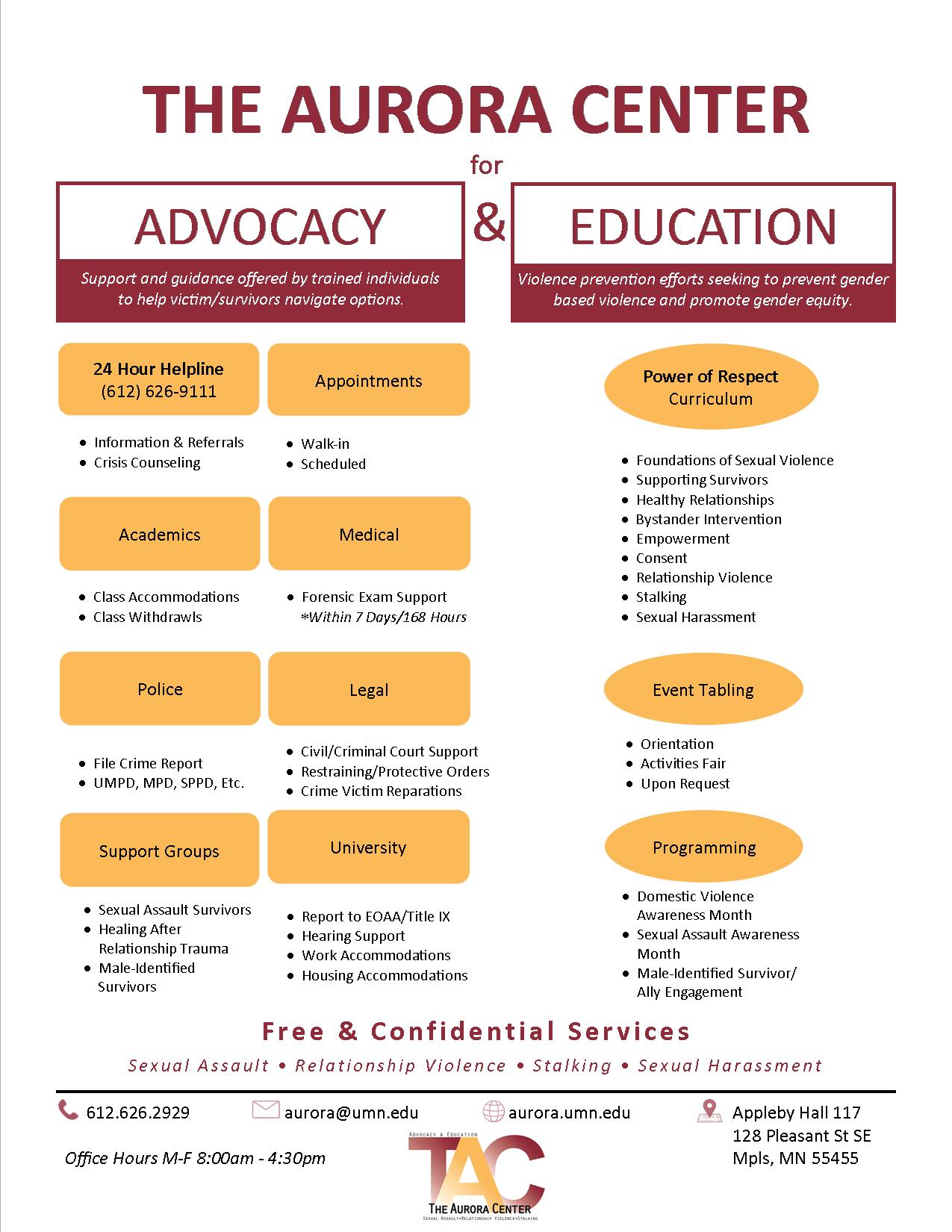Aurora's Services
Aurora's services are free and confidential to students, staff and faculty at the University of Minnesota-Twin Cities and Augsburg University who are victim/survivors and concerned folks of issues of sexual assault, relationship violence, stalking, or sexual harassment. Any student or staff who is impacted by these forms of violence is eligible for services, regardless of when/where the violence occurred or whether they want to take formal action or not. Aurora advocates can talk with you about a variety of options and provide you with essential support that is unique to your situation.
Aurora advocates can offer a variety of services and provide you with essential support that is unique to your situation. This may look like meeting with an advocate individually or joining a support group. For individuals seeking legal options, Aurora advocates can guide you through complex processes and connect you to necessary legal resources. Advocates can also locate medical, financial, or housing resources for survivors with these needs. Additionally, Aurora often assists students and staff with seeking academic/work accommodations to ensure that they can successfully and safely continue their education/employment. Even if it seems like there are no options available, we encourage you to seek services to gain support and guidance throughout this difficult time.
Advocates can meet with clients by appointment (in person or via Zoom). We accept drop-ins based on advocates' availability. Check out a list of our services at the bottom of this page or by clicking here.
To connect with a confidential advocate, reach out to us here:
Call our 24 Hour Helpline: (612) 626-9111
Send a message to our Text Line: (612) 615-8911 (M-F 8am-4:30pm only)
Email us: [email protected]
Confidentiality
What you choose to share with Aurora stays with Aurora. All of our staff and advocates complete a 40 hour certification training, which makes us confidential resources by Minnesota state statute 595.02, subd. k. This law states that "sexual assault counselors may not be allowed to disclose any opinion or information received from or about the victim without the consent of the victim." Aurora advocates do not share anything that our clients disclose to us with others.
We have two limits to confidentiality, which apply when a client discloses:
- A plan to harm others.
- Current or recent abuse or neglect of minors, by certain persons in their life
- Within the last 3 years for one minor victim.
- Within the last 10 years for multiple minor victims.
- Certain persons may include: family members, adults residing in the home, persons in a position of authority to the minor, and persons responsible for care of the minor.
Advocates will disclose limits to confidentiality at the beginning of each new client meeting or as needed before a disclosure is made on our helpline. Any mandated reports will be made either to the appropriate police department or Child Protective Services, with the knowledge of the client.
Please consult with an advocate if you have questions about our mandated reporting responsibilities. We are committed to ensuring that you receive support while also maintaining your privacy to the maximum extent possible.
Are other staff at UMN confidential?
Students who feel strong support from professors, advising staff, and other employees at the University may feel inclined to disclose experiences of violence with them. This happens often after violence has recently occurred and a student may ask their course instructor for accommodations and explain the circumstances. It is important to note that the majority of University of Minnesota employees are not confidential resources and are mandated to report disclosures of sexual misconduct to the Title IX office (EOAA).
You can learn more about employee obligations to report prohibited conduct in these resources:
Section III of the UMN Sexual Misconduct Policy.
Responding to Student Sexual Misconduct/Title IX Disclosures
When EOAA receives a report from an employee, they will email the impacted person with information about confidential resources and reporting options. Typically, they will not initiate any action unless the impacted person contacts them to start the formal grievance process. However, EOAA may choose to take some form of action upon receiving a mandated report in the following circumstances:
- EOAA identifies that there is a larger concern to campus safety (that one reported respondent has caused harm to multiple people or that egregious violence/use of a weapon is involved in reported conduct).
- The accused respondent is an employee. In this case, EOAA may need to initiate informal conversations with the employee's supervisor to encourage coaching or may need to take more formal action.
Aurora advocates, health providers at Boynton, and counselors at Student Counseling Services are all among confidential University resources and cannot report disclosures of sexual misconduct to EOAA. You can find a full list of University employees who are exempt from mandated reporting here. It is important to note that all University employees are mandated to report concerns of child abuse (similar to Aurora's responsibilities) as listed above.
